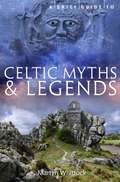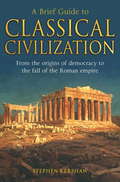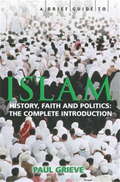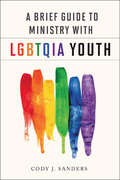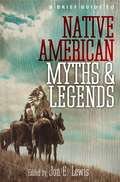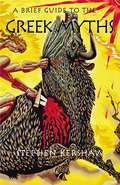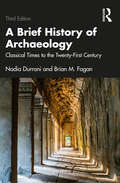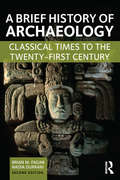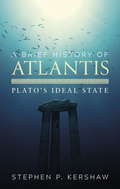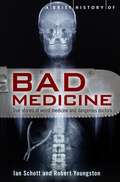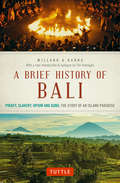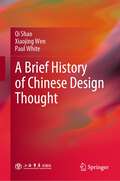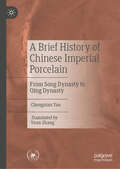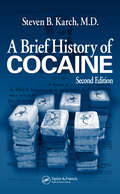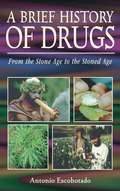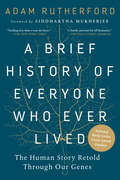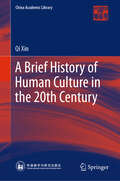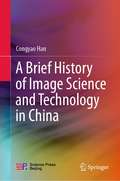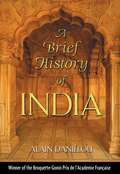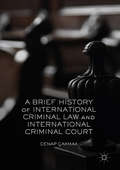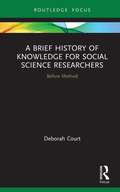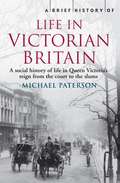- Table View
- List View
A Brief Guide to Celtic Myths and Legends (Brief Histories)
by Martyn WhittockA very readable guide which fills the gap between academic analysis and less critical retellings of the myths and legends. Marytn Whittock provides an accessible overview while also assessing the current state of research regarding the origins and significance of the myths. Since all records of the myths first occur in the early medieval period, the focus is on the survival of pre-Christian mythology and the interactions of the early Christian writers with these myths. A wide-ranging and enthralling introduction to Celtic mythology, from the Irish gods before gods, the Fomorians, to the children of Llyr, the sea deity; from the hunter-warrior Fionn mac Cumhaill, whose exploits are chronicled in the Fenian Cycle, to Cú Chulainn, the Hound of Ulster; and from the Welsh heroes of the Mabinogion to Arthur, King of Britain, though the mythical, Welsh version who predates the medieval legends.
A Brief Guide to Classical Civilization (Brief Histories)
by Dr Stephen P. KershawA general introduction to the classical world from its origins to the fall of the Roman Empire. The book focuses on questions of how we know about Classical civilization from archaeology and history; deals with the Mycenaean era and the world of Myth and Epic in Homer's Iliad & Odyssey; gives an outline of Greek history in the 5th & 4th Centuries BC; looks at Greek social life and the alternative model of Sparta, and considers the achievements of the Greeks in their art and architecture, tragedy and comedy. Turning to Rome, it engages with Roman history, the Roman Epic tradition, the fascinating features of Roman social life, analyses Roman satire, explores the urban environment in Pompeii and Herculaneum, and concludes with the End of Rome.
A Brief Guide to Islam: History, Faith and Politics: The Complete Introduction (Brief Histories)
by Paul GrieveExploring the beliefs, history and politics of the ordinary people of Muslim countries, Grieve cuts through the complexities as he examines all aspects of Islam. He also addresses the big issues: can Islam support true democracy? Is true democracy what the West really wants for Muslim countries or are we merely seeking a cover of legitimacy for a policy of 'might is right'?Paul Grieve is an unbeliever - he is not a born-again Muslim, a proselytizer or a frustrated desert romantic. His aim is to inform. The result is an accessible but never simplistic guide that challengesstereotypical views, from women and banking to war and Malcolm X. Complete with advice for visitors to Muslim countries, and with carefully chosen primary sources, maps and illustrations, this is the ideal summary for the reader looking for an unbiased overview of the religious and political world issues that have become part of our everyday lives.
A Brief Guide to Islam: The Complete Introduction
by Paul GrieveExploring the beliefs, history and politics of the ordinary people of Muslim countries, Grieve cuts through the complexities as he examines all aspects of Islam. He also addresses the big issues: can Islam support true democracy? Is true democracy what the West really wants for Muslim countries or are we merely seeking a cover of legitimacy for a policy of 'might is right'?Paul Grieve is an unbeliever - he is not a born-again Muslim, a proselytizer or a frustrated desert romantic. His aim is to inform. The result is an accessible but never simplistic guide that challengesstereotypical views, from women and banking to war and Malcolm X. Complete with advice for visitors to Muslim countries, and with carefully chosen primary sources, maps and illustrations, this is the ideal summary for the reader looking for an unbiased overview of the religious and political world issues that have become part of our everyday lives.
A Brief Guide to Ministry with LGBTQIA Youth
by Cody J. SandersDespite our best efforts to create welcoming and affirming congregations, the reality is that church can still be a harmful place to LGBTQIA youth. <P><P>Inside A Brief Guide to Ministry with LGBTQIA Youth, author Cody J. Sanders challenges pastors and church leaders to reflect on the various trials that adolescence brings for LGBTQIA youth. Designed for congregations that currently have a theologically and biblically affirming stance toward the LGBTQIA community, this unique resource provides insight and practical advice for tough questions like: <P><P><ul> <li>How does an affirming stance toward LGBTQIA people affect the day-to-day experience of teenagers in a church setting? </li> <li>In what ways can a church's youth ministry have a positive impact on the lives of LGBTQIA youth who want to fully live out their Christian faith and their gender identity? </li> <li>How can a pastor, youth minister, or youth ministry volunteer embrace, nurture, and provide skillful care for LGBTQIA youth in a congregation or community?</li></ul> <P><P>A glossary of terms to use when talking about LGBTQIA issues and a list of national and location resources that can be used to support LGBTQIA youth are included.
A Brief Guide to Native American Myths and Legends: With a new introduction and commentary by Jon E. Lewis
by Lewis SpenceIn this brilliant reworking of Lewis Spence's seminal Myths and Legends of the North American Indians, Jon E. Lewis puts the work in context with an extensive new introductory essay and additional commentary throughout the book on the history of Native Americans, their language and lifestyle, culture and religion/mythology. He includes examples of myths from tribes omitted by Spence, a guide to tribes and their myths by region, a basic Lakota (Sioux) glossary, guides to key pronunciations and a bibliography.
A Brief Guide to Native American Myths and Legends: With a new introduction and commentary by Jon E. Lewis (Brief Histories)
by Lewis SpenceIn this brilliant reworking of Lewis Spence's seminal Myths and Legends of the North American Indians, Jon E. Lewis puts the work in context with an extensive new introductory essay and additional commentary throughout the book on the history of Native Americans, their language and lifestyle, culture and religion/mythology. He includes examples of myths from tribes omitted by Spence, a guide to tribes and their myths by region, a basic Lakota (Sioux) glossary, guides to key pronunciations and a bibliography.
A Brief Guide to the Greek Myths
by Stephen P. KershawThe book leads the reader through these vibrant stories, from the origins of the gods through to the homecomings of the Trojan heroes. All the familiar narratives are here, along with some less familiar characters and motifs. In addition to the tales, the book explains key issues arising from the narratives, and discusses the myths and their wider relevance.This long-overdue book crystallises three key areas of interest: the nature of the tales; the stories themselves; and how they have and might be interpreted. For the first time, it brings together aspects of Greek mythology only usually available in disparate forms - namely children's books and academic works. There will be much here that is interesting, surprising, and strange as well as familiar. Experts and non-experts, adults, students and schoolchildren alike will gain entertainment and insight from this fascinating and important volume.
A Brief Guide to the Greek Myths (Brief Histories)
by Dr Stephen P. KershawThe book leads the reader through these vibrant stories, from the origins of the gods through to the homecomings of the Trojan heroes. All the familiar narratives are here, along with some less familiar characters and motifs. In addition to the tales, the book explains key issues arising from the narratives, and discusses the myths and their wider relevance.This long-overdue book crystallises three key areas of interest: the nature of the tales; the stories themselves; and how they have and might be interpreted. For the first time, it brings together aspects of Greek mythology only usually available in disparate forms - namely children's books and academic works. There will be much here that is interesting, surprising, and strange as well as familiar. Experts and non-experts, adults, students and schoolchildren alike will gain entertainment and insight from this fascinating and important volume.
A Brief History of Archaeology: Classical Times to the Twenty-First Century
by Brian M. Fagan Nadia DurraniA Brief History of Archaeology details early digs and covers the development of archaeology as a multidisciplinary science, the modernization of meticulous excavation methods during the twentieth century, and the important discoveries that led to new ideas about the evolution of human societies. Spanning more than two thousand years of history, this short account of the discipline of archaeology tells of spectacular discoveries and the colorful lives of the archaeologists who made them, as well as of changing theories and current debates in the field. Early research at Stonehenge in Britain, burial mound excavations, and the exploration of Herculaneum and Pompeii culminate in the nineteenth-century debates over human antiquity and the theory of evolution. The book then moves on to the discovery of the world’s pre-industrial civilizations in Egypt, Mesopotamia, and Central America; the excavations at Troy and Mycenae; the Royal Burials at Ur, Iraq; and the dramatic finding of the pharaoh Tutankhamun in 1922. The book concludes by considering recent sensational discoveries and exploring the debates over processual and post-processual theory that have intrigued archaeologists in the early twenty-first century. The third edition updates this respected introduction to one of the science’s most fascinating disciplines. A Brief History of Archaeology is a vivid narrative that will engage readers who are new to the discipline, drawing on the authors’ extensive experience in the field and classroom.
A Brief History of Archaeology: Classical Times to the Twenty-First Century
by Brian M. Fagan Nadia DurraniThis short account of the discipline of archaeology tells of spectacular discoveries and the colorful lives of the archaeologists who made them, as well as of changing theories and current debates in the field. Spanning over two thousand years of history, the book details early digs as well as covering the development of archaeology as a multidisciplinary science, the modernization of meticulous excavation methods during the twentieth century, and the important discoveries that led to new ideas about the evolution of human societies. A Brief History of Archaeology is a vivid narrative that will engage readers who are new to the discipline, drawing on the authors’ extensive experience in the field and classroom. Early research at Stonehenge in Britain, burial mound excavations, and the exploration of Herculaneum and Pompeii culminate in the nineteenth century debates over human antiquity and the theory of evolution. The book then moves on to the discovery of the world’s pre-industrial civilizations in Egypt, Mesopotamia, and Central America, the excavations at Troy and Mycenae, the Royal Burials at Ur, Iraq, and the dramatic finding of the pharaoh Tutankhamun in 1922. The book concludes by considering recent sensational discoveries, such as the Lords of Sipán in Peru, and exploring the debates over processual and postprocessual theory which have intrigued archaeologists in the early 21st century. The second edition updates this respected introduction to one of the sciences’ most fascinating disciplines.
A Brief History of Atlantis: Plato's Ideal State (Brief Histories)
by Dr Stephen P. KershawThe Atlantis story remains one of the most haunting and enigmatic tales from antiquity, and one that still resonates very deeply with the modern imagination. But where did Atlantis come from, what was it like, and where did it go to?Atlantis was first introduced by the Greek philosopher Plato in two dialogues the Timaios and Kritias, written in the fourth century BC. As he philosophises about the origins of life, the Universe and humanity, the great thinker puts forward a stunning description of Atlantis, an island paradise with an ideal society. But the Atlanteans degenerate and become imperialist aggressors: they fight against antediluvian Athens, which heroically repels their mighty forces, before a cataclysmic natural disaster destroys the warring states. His tale of a great empire that sank beneath the waves has sparked thousands of years of debate over whether Atlantis really existed. But did Plato mean his tale as history, or just as a parable to help illustrate his philosophy?The book is broken down into two main sections plus a coda - firstly the translations/commentaries which will have the discussions of the specifics of the actual texts; secondly a look at the reception of the myth from then to now; thirdly a brief round-off bringing it all together.
A Brief History of Bad Medicine (Brief Histories)
by Ian Schott Robert YoungstonA doctor removes the normal, healthy side of a patient's brain instead of the malignant tumor. A man whose leg is scheduled for amputation wakes up to find his healthy leg removed. These recent examples are part of a history of medical disasters and embarrassments as old as the profession itself.In Brief History of Bad Medicine, Robert M. Youngson and Ian Schott have written the definitive account of medical mishap in modern and not-so- modern times. From famous quacks to curious forms of sexual healing, from blunders with the brain to drugs worse than the diseases they are intended to treat, the book reveals shamefully dangerous doctors, human guinea pigs, and the legendary surgeon who was himself a craven morphine addict.Exploring the line between the comical and the tragic, the honest mistake and the intentional crime, Brief History of Bad Medicine illustrates once and for all that you can't always trust the people in white coats.
A Brief History of Bali: The Story of a Pacific Paradise
by Willard A. Hanna Tim HanniganThis book tells the story of Bali-the "paradise island of the Pacific"-its rulers and its people, and their encounters with the Western world.Bali is a perennially popular tourist destination. It is also home to a fascinating people with a long and dramatic history of interactions with foreigners, particularly after the arrival of the first Dutch fleet in 1597. In this first comprehensive history of Bali, author Willard Hanna chronicles Bali through the centuries as well as the islanders' current struggle to preserve their unique identity amidst the financially necessary incursions of tourism.Illustrated with more than forty stunning photographs, A Brief History of Bali is a riveting tale of one ancient culture's vulnerability-and resilience-in the modern world.
A Brief History of Chinese Design Thought
by Paul White Qi Shao Xiaojing WenThis book introduces readers to the history of design thinking in pre-modern China. The content is structured according to successive dynasties, covering the seven major periods of the pre-Qin, Qin and Han, Wei and Jin, Sui and Tang, Song and Yuan, Ming, and Qing dynasties. Each chapter introduces the most representative individuals of the period and discusses their work and ideas in order to reveal the national and cultural features of the respective periods. A distinctive feature of cultural identity running through the long course of China’s historical development is the argument that actions are determined by ideas: Such a view can be found in long-standing thinking on art, design, and creativity. The book demonstrates that conscious design is the vital link between the ideas that constitute human cultures and the physical objects that make up their resulting material cultures. It is the attribute of design that defines what it is to be human and also produces the physical evidence of the evolution of Chinese civilization. The book reveals the integrated characteristics of Chinese culture and art and shows how both changing and recurring ideologies have influenced Chinese design practice since the ancient Shang and Zhou dynasties and how these forces have shaped the spirit and materiality of Chinese civilization. Design is the cornerstone that has made China one of the major contributors to human civilization throughout the thousands of years of its history.Given its focus, the book largely appeals to two main audiences: an academic readership of students and researchers interested in cultural studies and, a more general one, consisting of those interested in international comparisons and wishing to learn more about Chinese history, society, and culture. In order to appeal to both, the book is written in a clear and accessible language.
A Brief History of Chinese Imperial Porcelain: From Song Dynasty to Qing Dynasty
by Chongnian YanThis book provides a unique history of the Porcelain Road against the backdrop of Chinese and Western cultural exchanges. Written by one of China’s most influential scholars, it introduces the history of Chinese Porcelain, especially the history of the imperial porcelain kiln, taking the most representative porcelain of each period as examples, and examining relevant historical background. Studying artifacts from well-known collections such as the Palace Museum, Taipei Palace Museum, Shenyang Palace Museum, Nanjing Museum, this text offers a unique discussion of China’s porcelain culture and history, and will be of relevance to all those interested in one of the key aspects of Chinese culture and cultural exchanges between East and West.
A Brief History of Cocaine
by Steven B. Karch MD FFFLMA Brief History of Cocaine, Second Edition provides a fascinating historical insight into the reasons why cocaine use is increasing in popularity and why the rise of the cocaine trade is tightly linked with the rise of terrorism The author illustrates the challenges faced by today's governments and explains why current anti-drug efforts have had only a limited effect on this global market.This updated edition reexamines the impact of cocaine production, trade, and consumption on society beginning in the 16th century. It shows how the commercialization of cocaine was driven by cartels of Swiss and German pharmaceutical companies and private enterprises across Europe, Asia, and the United States. The author shows how government policies slowly transformed from trade, shipping, and manufacturing regulations, with little or no success in stemming the flow of drugs. The book describes how anti-drug laws, treaties, and costly initiatives involving crop substitution, crop suppression, interdiction, and international cooperation were first attempted more than 400 years ago and why these strategies failed for Colonial Spain and later backfired on the League of Nations. The author shows how economic necessity among growers, the environmental impact of pesticides, the potential for genetic engineering of coca plants, and other loopholes have actually been counterproductive, undermining the current efforts to curb the cocaine trade. Featuring new and reorganized chapters, A Brief History of Cocaine, Second Edition contains the latest data and statistics relating drug trafficking to terrorism, and explains recent trends in worldwide production, consumption, cost competition, and international transport. This book offers a well-rounded historical perspective that is ideal for criminal justice practitioners, teachers, students, and anyone interested in this topic.
A Brief History of Drugs: From the Stone Age to the Stoned Age
by Antonio EscohotadoA clear-eyed look at the instrumental role drugs have played in our cultural, social, and spiritual development. • First American publication of the surprising European bestseller. • Examines everything from the ancient use of ergot and datura to the modern phenomenon of "designer" drugs such as Ecstasy and crack cocaine. From remotest antiquity to the present era of designer drugs and interdiction, drugs have played a prominent role in the cultural, spiritual, and social development of civilizations. Antonio Escohotado demonstrates how the history of drugs illuminates the history of humanity as he explores the long relationship between mankind and mind-altering substances. Hemp, for example, has been used in India since time immemorial to stimulate mental agility and sexual prowess. Aristotle's disciple Theophrastus testifies to the use of datura by the ancient Greeks and further evidence links the rites at Eleusis to the ingestion of a hallucinogen. Similar examples can be found in cultures as diverse as the Celts, the ancient Egyptians, the Aztecs, and other indigenous peoples around the world. Professor Escohotado also looks at the present-day differences that exist between the more drug-tolerant societies like Holland and Switzerland and countries advocating complete repression of these substances. The author provides a comprehensive analysis of the enormous social costs of the drug war that is coming under increasing fire from all levels of society. Professor Escohotado's work demonstrates that drugs have always existed and been used by societies throughout the world and the contribution they have made to humanity's development has been enormous. The choice we face today is to teach people how to use them correctly or to continue to indiscriminately demonize them. "Just say no," the author says, is not an option. Just say "know" is. Antonio Escohotado is a professor of philosophy and social science methodology at the National University of Distance Education in Madrid, Spain. He travels widely, offering lectures and seminars on the subject of drugs and history.
A Brief History of Everyone Who Ever Lived: The Human Story Retold Through Our Genes
by Siddhartha Mukherjee Adam RutherfordNational Book Critics Circle Award—2017 Nonfiction Finalist “Nothing less than a tour de force—a heady amalgam of science, history, a little bit of anthropology and plenty of nuanced, captivating storytelling.”—The New York Times Book Review, Editor’s Choice A National Geographic Best Book of 2017 In our unique genomes, every one of us carries the story of our species—births, deaths, disease, war, famine, migration, and a lot of sex. But those stories have always been locked away—until now. Who are our ancestors? Where did they come from? Geneticists have suddenly become historians, and the hard evidence in our DNA has blown the lid off what we thought we knew. Acclaimed science writer Adam Rutherford explains exactly how genomics is completely rewriting the human story—from 100,000 years ago to the present.
A Brief History of Human Culture in the 20th Century (China Academic Library)
by Qi XinThis book examines the cultural concepts that guided the development of the “age of mankind”— the changes that took place in historical, philosophical, scientific, religious, literary, and artistic thought in the 20th century. It discusses a broad range of major topics, including the spread of commercial capitalism; socialist revolutions; the two world wars; anti-colonialist national liberation movements; scientific progress; the clashes and fusion of Eastern and Western cultures; globalization; women’s rights movements; mass media and entertainment; the age of information and the digital society. The combination of cultural phenomena and theoretical descriptions ensures a unity of culture, history and logic. Lastly, the book explores the enormous changes in lifestyles and the virtualized future, revealing cultural characteristics and discussing 21st -century trends in the context of information technology, globalization and the digital era.
A Brief History of Image Science and Technology in China
by Congyao HanThis book, within the vision of the study on the image history, clearly manifests the development of Chinese image science and technology of over 2000 years based on compendium, while having briefly sorted out expositions by scientists since ancient times in China, demonstrates the spiritual course, ideas of thinking and forms of life and reveales profound humane ideas, basis of sentiments and styles of the spirit featured by Chinese image culture. The historic outline of images is clear-cut along with authenticated inter-attestation for clues of images and texts. Historic facts concerning images are ecologically diversified, while historic documents about images are properly chosen, in addition to the integration between liberal arts and science and perfect combination between images and texts. Blessed with nice integration between images and texts, this book serves as reference to experts, scholars, undergraduates and postgraduates related to the study on image history, history of science and technology, study of history and news communication.
A Brief History of India
by Alain Daniélou Kenneth F. HurryDaniélou's powerful rebuttal to the conventional view of India's history, which calls for a massive reevaluation of the history of humanity• Explores historical occurrences from each major time period starting with the first appearance of man 30,000 years ago• Couples the clarity and perspective of an outsider with the unique and specific knowledge of an insider• By the internationally recognized Hindu scholar and translator of The Complete Kama Sutra (200,000 copies sold)Alain Daniélou approaches the history of India from a new perspective--as a sympathetic outsider, yet one who understands the deepest workings of the culture. Because the history of India covers such a long span of time, rather than try to create an exhaustive chronology of dates and events, Daniélou instead focuses on enduring institutions that remain constant despite the ephemeral historical events that occur. His selections, synthesis, and narration create a thoroughly engaging and readable journey through time, with a level of detail and comprehensiveness that is truly a marvel.Because of the continuity of its civilization, its unique social system, and the tremendous diversity of cultures, races, languages, and religions that exist in its vast territory, India is like a history museum. Its diverse groups maintained their separate identities and never fully supplanted the culture and knowledge of their predecessors. Even today one may encounter in India primitive Stone Age people whose technology has remained at what is considered prehistoric levels. Thus Daniélou's examination of India reveals not only the diversity and historical events and trends of that country, but also the history of all mankind. Through Daniélou's history of India we learn from whence we came, what we have discovered over the years in the fields of science, arts, technology, social structures, religions, and philosophical concepts, and what the future may hold for us.
A Brief History of International Criminal Law and International Criminal Court
by Cenap ÇakmakThis book offers a historical presentation of how international criminal law has evolved from a national setting to embodying a truly international outlook. As a growing part of international law this is an area that has attracted growing attention as a result of the mass atrocities and heinous crimes committed in different parts of the world. Çakmak pays particular attention to how the first permanent international criminal court was created and goes on to show how solutions developed to address international crimes have remained inadequate and failed to restore justice. Calling for a truly global approach as the only real solution to dealing with the most severe international crimes, this text will be of great interest to scholars of criminal justice, political science, and international relations.
A Brief History of Knowledge for Social Science Researchers: Before Method
by Deborah CourtA Brief History of Knowledge for Social Science Researchers outlines a history of knowledge from Ancient Greece to present day, in Europe and the Western world. This outline provides the basis for understanding where various research methods originate, and their epistemological, historical, political and social roots. This book provides social science researchers with an understanding of how research methods developed, and how their truth criteria, and what is accepted as knowledge, spring from human history. Research is often reduced to data collection, results and publication in the stressful, results-oriented academic environment. But research is a human enterprise, a product of both individual creativity and historical, political and social conditions. This book will focus on how shared research criteria (as we know them today) were developed through the work and thought of philosophers, social activists and researchers. This book will be useful for graduate and post-graduate students, particularly those studying Research Methods, and Philosophy of Science courses; and for experienced social science researchers who wish to understand how research methods have developed in human history.
A Brief History of Life in Victorian Britain (Brief Histories)
by Michael PatersonThe Victorian era has dominated the popular imagination like no other period, but these myths and stories also give a very distorted view of the 19th century. The early Victorians were much stranger that we usually imagine, and their world would have felt very different from our own and it was only during the long reign of the Queen that a modern society emerged in unexpected ways. Using character portraits, events, and key moments Paterson brings the real life of Victorian Britain alive - from the lifestyles of the aristocrats to the lowest ranks of the London slums. This includes the right way to use a fan, why morning visits were conducted in the afternoon, what the Victorian family ate and how they enjoyed their free time, as well as the Victorian legacy today - convenience food, coffee bars, window shopping, mass media, and celebrity culture.Praise for Dicken's London:Out of the babble of voices, Michael Paterson has been able to extract the essence of London itself. Read this book and re-enter the labyrinth of a now-ancient city.' Peter Ackroyd
